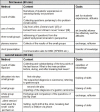Breaking bad news - an interdisciplinary curricular teaching-concept
- PMID: 22205910
- PMCID: PMC3244731
- DOI: 10.3205/zma000764
Breaking bad news - an interdisciplinary curricular teaching-concept
Abstract
Background: The concerns of patients suffering from life-threatening disease and end-of-life care aspects have gained increasing attention in public perception. The increasing focus on palliative medicine questions can be considered to be paradigmatic for this development. Palliative medicine became a compulsory subject of the undergraduate curriculum in Germany to be implemented until 2013. The preexisting conditions and qualifications at the medical faculties vary, though. We describe the conceptual process, didactic background, and first experiences with the new interdisciplinary course "Delivering bad news" as a compulsory part of the palliative medicine curriculum.
Methods: Since autumn 2009, this course has been taught at the University Medical Center Göttingen, consisting of two double lessons in the final year of medical education. Considering the curriculum-based learning goals in Göttingen, the focus of this course is to impart knowledge, attitudes and communication skills relating to "bad news".
Results: Although the seminar requires adequate staff and is time-consuming, students have accepted it and gave high marks in evaluations. In particular, the teachers' performance and commitment was evaluated positively.
Discussion and conclusions: We describe the first experiences with a new course. Didactic structure, theoretical contents, role-plays and usage of media (film, novel) are well- suited to communicate topics such as "bad news". Additional experiences and evaluations are necessary. According to the progressive nature of learning, it might be worthwhile to repeat communication- centered questions several times during medical studies.
Zielsetzung: Verschiedene Aspekte bei der Behandlung lebensbedrohlich erkrankter Patienten und der Begleitung Sterbender rücken zunehmend in den gesellschaftlichen Fokus. Paradigmatisch hierfür kann die zunehmende Aufmerksamkeit gegenüber palliativmedizinischen Inhalten betrachtet werden, die seit der letzten Änderung der ärztlichen Approbationsordnung im Medizinstudium ab 2013 verpflichtend unterrichtet und geprüft werden müssen. Die didaktischen Vorerfahrungen und strukturellen Voraussetzungen zur Integration von Lebensend-Themen in das studentische Curriculum sind an den einzelnen Fakultäten jedoch sehr unterschiedlich. Dieser Artikel beschreibt die Konzeption des neuen Pflichtseminars „Überbringen schlechter Nachrichten“, dessen didaktischen Hintergrund sowie erste Erfahrungen bei der Durchführung für Studierende unmittelbar vor Eintritt in das Praktische Jahr
Methodik: An der Universitätsmedizin Göttingen wird seit dem Wintersemester 2009 ein aus zwei Doppelstunden bestehendes Pflicht-Seminar zum Thema „Überbringen schwerwiegender Nachrichten“ unterrichtet. Unter Berücksichtigung des Göttinger Lernzielkataloges wird Wissen vermittelt, die kommunikativen Fertigkeiten in Form von Rollenspielen verbessert und die affektive Ebene durch den Einsatz von Literatur mit einbezogen.
Ergebnisse und Schlussfolgerung: Das Seminar ist zwar zeit- und personalaufwendig, wird aber von den Studierenden gut angenommen und evaluiert. Besonders positiv wird das Auftreten der Dozenten bewertet. Der didaktische Aufbau von Lerninhalten durch Kombination von Medien (Filmausschnitt, Roman), Kleingruppenarbeit und Rollenspielen ist zur Vermittlung des Themas gut geeignet. Weitere Evaluationen müssen folgen. Wünschenswert wäre im Sinne der Lernspirale ein mehrfaches Aufgreifen des Themas innerhalb des Studiums.
Keywords: communication skills; medical teaching; palliative medicine; role play.
Figures
Similar articles
-
Implementation of palliative care as a mandatory cross-disciplinary subject (QB13) at the Medical Faculty of the Heinrich-Heine-University Düsseldorf, Germany.GMS Z Med Ausbild. 2015 Feb 11;32(1):Doc6. doi: 10.3205/zma000948. eCollection 2015. GMS Z Med Ausbild. 2015. PMID: 25699109 Free PMC article.
-
Palliative Care teaching in Germany - concepts and future developments.GMS Z Med Ausbild. 2012;29(3):Doc47. doi: 10.3205/zma000817. Epub 2012 May 15. GMS Z Med Ausbild. 2012. PMID: 22737202 Free PMC article.
-
[Cross-sectional field pain medicine Q14 - the Mainz model : Development of the pain medicine curriculum in the standard study course at the University Medical School of the Johannes Gutenberg University Mainz].Schmerz. 2017 Oct;31(5):499-507. doi: 10.1007/s00482-017-0210-5. Schmerz. 2017. PMID: 28341932 German.
-
The experiences of health professionals, patients, and families with truth disclosure when breaking bad news in palliative care: A qualitative meta-synthesis.Palliat Support Care. 2022 Jun;20(3):433-444. doi: 10.1017/S1478951521001243. Palliat Support Care. 2022. PMID: 35713348 Review.
-
Palliative care module within a required geriatrics clerkship: taking advantage of existing partnerships.Acad Med. 2002 Sep;77(9):936-7. doi: 10.1097/00001888-200209000-00042. Acad Med. 2002. PMID: 12228108 Review.
Cited by
-
Breaking bad news issues: a survey among physicians.Oman Med J. 2013 Jan;28(1):20-5. doi: 10.5001/omj.2013.05. Oman Med J. 2013. PMID: 23386940 Free PMC article.
-
Delivering Bad News: Self-Assessment and Educational Preferences of Medical Students.Int J Environ Res Public Health. 2022 Feb 24;19(5):2622. doi: 10.3390/ijerph19052622. Int J Environ Res Public Health. 2022. PMID: 35270311 Free PMC article.
-
"It's Not that Easy"--Medical Students' Fears and Barriers in End-of-Life Communication.J Cancer Educ. 2015 Jun;30(2):333-9. doi: 10.1007/s13187-014-0712-0. J Cancer Educ. 2015. PMID: 25113025
-
How to break bad news and how to learn this skill: results from an international North-Eastern German Society for Gynecological Oncology (NOGGO) survey among physicians and medical students with 1089 participants.Int J Gynecol Cancer. 2023 Dec 4;33(12):1934-1942. doi: 10.1136/ijgc-2023-004693. Int J Gynecol Cancer. 2023. PMID: 38052472 Free PMC article.
References
-
- Shipman C, Gysels M, White P, Worth A, Murray SA, Barclay S, Forrest S, Shepherd J, Dale J, Dewar S, Peters M, White S, Richardson A, Lorenz K, Koffman J, Higginson IJ. Improving generalist end of life care: national consultation with practitioners, commissioners, academics, and service user groups. BMJ. 2008;(337):a1720. doi: 10.1136/bmj.a1720. Available from: http://dx.doi.org/10.1136/bmj.a1720. - DOI - DOI - PMC - PubMed
-
- Laske A, Dietz I, Ilse B, Nauck F, Elsner F. Palliativmedizinische Lehre in Deutschland: Bestandsaufnahme an den medizinischen Fakultäten 2009. Z Palliativmed. 2010;11:18–25. doi: 10.1055/s-0029-1223482. Available from: http://dx.doi.org/10.1055/s-0029-1223482. - DOI - DOI
-
- Alt-Epping B, Jung W, Simmenroth-Nayda A, Russo SG, Nauck F. Implementierung des Querschnittsfachs Palliativmedizin vor dem Hintergrund der neuen gesetzlichen Rahmenbedingungen am Beispiel der Universitätsmedizin Göttingen. GMS Z Med Ausbild. 2010;27(5):Doc67. doi: 10.3205/zma000704. Available from: http://dx.doi.org/10.3205/zma000704. - DOI - DOI - PMC - PubMed
-
- Müller-Busch C, Elsner F, Fittkau-Toennesmann B, Schiessl C. Curriculum: Grundlagen der Palliativmedizin. Berlin: Deutsche Gesellschaft für Palliativmedizin; 2009. Available from: http://www.dgpalliativmedizin.de/images/stories/pdf/ag/090810%20AG%20AFW....
-
- Thomas JD, Arnold RM. Giving Feedback. J Palliat Med. 2011;14(2:233-239. http):233–239. doi: 10.1089/jpm.2010.0093. Available from: http://dx.doi.org/10.1089/jpm.2010.0093. - DOI - DOI - PubMed
MeSH terms
LinkOut - more resources
Full Text Sources
Medical
Molecular Biology Databases
Research Materials




